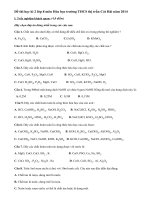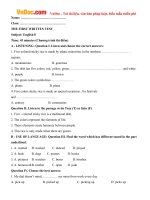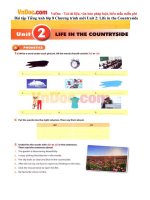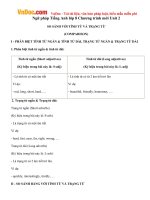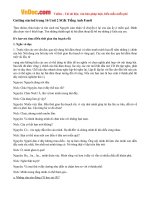Tải Trắc nghiệm Reading tiếng Anh lớp 8 Unit 2 Life In The Countryside - Bài tập Tiếng Anh 8 theo Unit có đáp án
Bạn đang xem bản rút gọn của tài liệu. Xem và tải ngay bản đầy đủ của tài liệu tại đây (101.83 KB, 5 trang )
<span class='text_page_counter'>(1)</span><div class='page_container' data-page=1>
<b>TRẮC NGHIỆM</b>
<b> TIẾNG ANH 8</b>
<b> THEO UNIT</b>
<b>UNIT 2: LIFE IN THE COUNTRYSIDE</b>
I. <b>Choose the correct word A, B, C or D for each gap to complete the</b>
<b>following passage.</b>
My parents are farmers. They work very (1) ………… on the paddy fields.
They usually get (2) ………… very early in the morning. After (3) …………
breakfast, they feed the buffaloes, pigs, chickens, ducks and they (4) ………… the
eggs. From about eight, they work on the fields. They (5) ………… rice but their
main (6) ………… is vegetables. From eleven thirty to one thirty, they rest and have
lunch. They continue to work until five in the afternoon, then they come back home.
My mother (7) ………… the animals again while my father (8)
………… the buffalo shed and the chicken coop. They usually finish their work at
about six thirty. Twice a week, my mother (9) ………… the vegetables and eggs to the
town market to sell them then she often buys the things we need for our daily life. She
also (10) ………… me a small present each time.
A. hard
A. on
B. hardly
B. off
C. harder
C. up
D. hardest
D. in
A. to have B. having C. have D. had
A. take
A. plant
B. see
B. water
C. have
C. grow
D. collect
D. cut
A. period
A. leads
B. crop
B. feeds
C. time
C. gives
D. harvest
D. calls
A. cleans B. washes C. polishes D. clears
A. makes
A. buying
B. takes
B. buys
C. carries
C. to buy
D. brings
D. bought
II. <b>Read the text and answer the questions below.</b>
</div>
<span class='text_page_counter'>(2)</span><div class='page_container' data-page=2>
They left early in the morning and went there by bus. Nick’s uncle, Mr. Brown
met them at the bus stop and took them to his farm. On the way. Uncle Brown
showed them the field of wheat and vegetables where some tractors were running up
and down, ploughing and breaking soil, distributing manure and planting potatoes.
After lunch, they all went for a walk. In the large yard of the farm, they saw
some farm machines. Among them is the biggest machine which is called a combine
harvester. They were told that this machine can cut and thresh corn at the same time.
In the afternoon, they went to the place where cattle such as horses, sheep
and cows were raised. They were very excited to see how cows were milked by the
workers there. Uncle Brown also spoke about many interesting things in the
countryside. After having some fruits and cakes, they said goodbye and went home.
1.How did Peter and his classmates go to Uncle Brown’s farm?
2.What does his uncle grow on his farm?
3.What can a tractor do?
4.What is typical of a combine harvester?
5.Which kinds of cattle are raised in Uncle Brown’s farm?
<i>Đáp án:</i>
<i>1. They went there by bus.</i>
<i>2. He grows wheat, vegetables and potatoes.</i>
<i>3. It can plough and break soil, distribute manure and plant potatoes.</i>
<i>4. A combine harvester can cut and thresh corn at the same time.</i>
<i>5. The cattle such as horses, sheep and cows are raised in Uncle Brown’s farm.</i>
III. <b>Choose the item among A, B, C or D that best answers each question </b>
<b>about the passage.</b>
Living in the country is something that people from the city often dream
about.
</div>
<span class='text_page_counter'>(3)</span><div class='page_container' data-page=3>
There are certainly many advantages to living in the country. First, you can enjoy
peace and quietness. Moreover, people tend to be friendlier. A further advantage is
that there is less traffic, so it is safer for young children.
However, there are certain disadvantages or drawbacks to life outside the city.
First, because there are fewer people, you are likely to have few friends. In addition,
entertainment is difficult to find, particularly in the evening. Furthermore, the fact that
there are fewer shops and services means that it is hard to find jobs.
In short, it can be seen that the country is more suitable for some people than others.
On the whole, it is often the best for those who are retired or who have young
children. In contrast, young people who have a career are better provided in the city.
1.According to the passage, living in the country has ………
A.only good points B. only bad points
C. both good and bad points D. no disadvantages
2.How many advantages does living in the country have?
A.Two B. Three C. Four D. No
3.Living in the country is safer for young children because ………
A. there is less traffic
B. there are few shops
C. there are fewer people
D. there are few services
4.Which of the following statements is NOT true according to the passage?
A. People in the country tend to be friendlier than people in the city.
B. It’s hard to find entertainment in the country.
C. There are fewer shops and services in the country.
D. The country is only suitable for retired people.
5.Having few friends is ………
A. one of drawbacks to life in the country.
</div>
<span class='text_page_counter'>(4)</span><div class='page_container' data-page=4>
C. one of certain drawbacks to life outside the city.
D. one of certain advantages to life outside the city.
<b>IV. Read the following passage and answer the questions.</b>
Hi! My name is Marek. I’ve been staying in England on an exchange visit and
I’ve found it a very interesting experience. I’ve been staying with a boy called Peter
and his family for two weeks. The first thing I learnt was how to great English
people. When I met Peter and his parents at the airport, I tried to kiss them on the
cheeks. His parents looked a bit shocked but let me kiss them. Peter just smiled and
said “Hi!”.
The city where they live is very interesting, and is much bigger than my small
village. I’ve never seen so many motorways, and there’s a recycling bin on every
corner. It’s really noisy, tough, and there are so many cars that they need to have
traffic lights everywhere.
I like it here but I think I still prefer the countryside. There are more trees and
animals, and not so many factories.
In all, I’ve learnt a lot from my exchange but I’ll be glad to get back to Poland. I
wonder what Peter will think when he comes to stay here!
1.How long has Marek been in England?
2.How did he greet Peter’s parents at the airport?
3.What hasn’t Marek seen before?
4.Does Marek prefer cities or the countryside?
5.Where does Marek come from?
<i>Đáp án</i>
<i>1. He has been in England for two weeks.</i>
<i>2. He kissed them on the cheeks.</i>
<i>3. He hasn’t seen so many motorways before.</i>
<i>4. He prefers the countryside.</i>
<i>5. He comes from Poland.</i>
</div>
<span class='text_page_counter'>(5)</span><div class='page_container' data-page=5>
Bài tập Tiếng Anh lớp 8 theo từng Unit: />
Bài tập Tiếng Anh lớp 8 nâng cao: />
</div>
<!--links-->
BÀI tập TIẾNG ANH lớp 8 cả năm có đáp án
- 75
- 15
- 49


